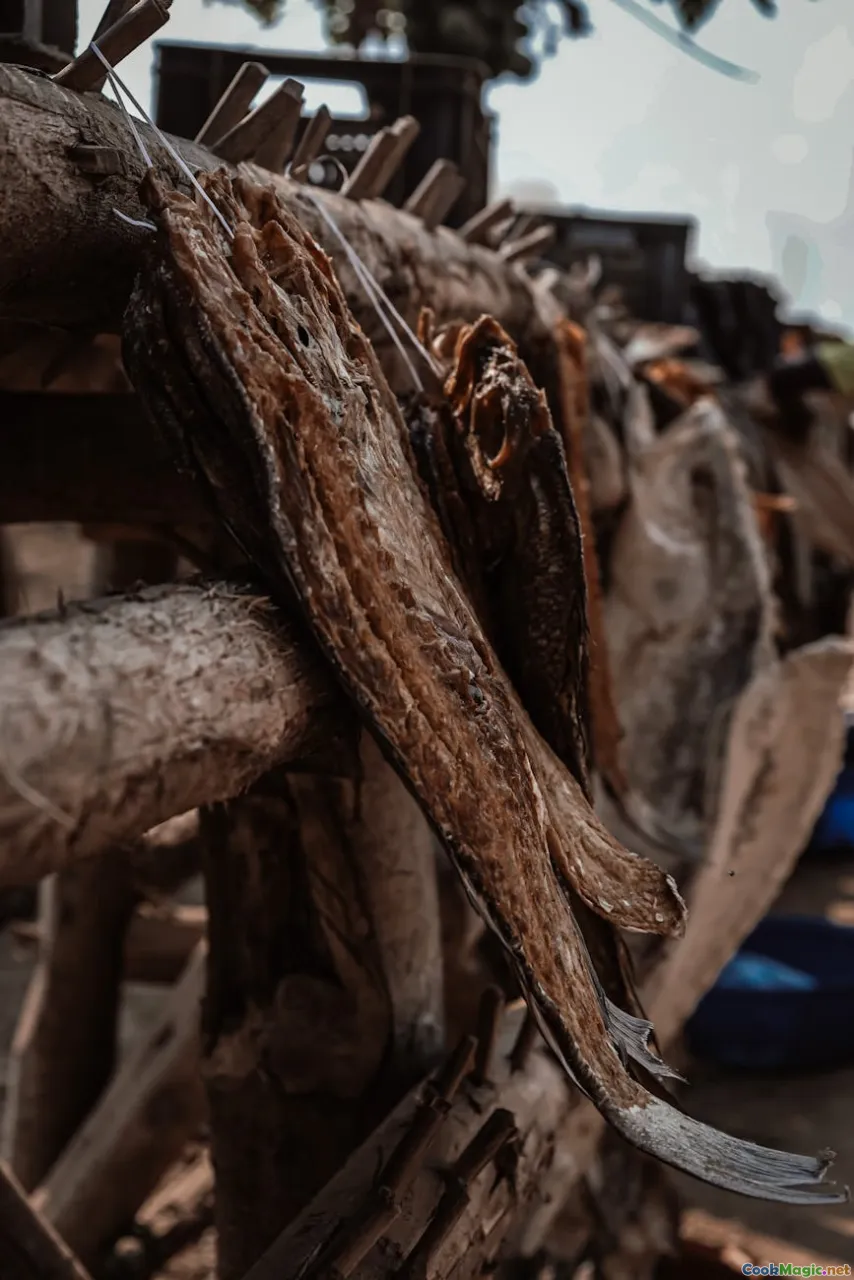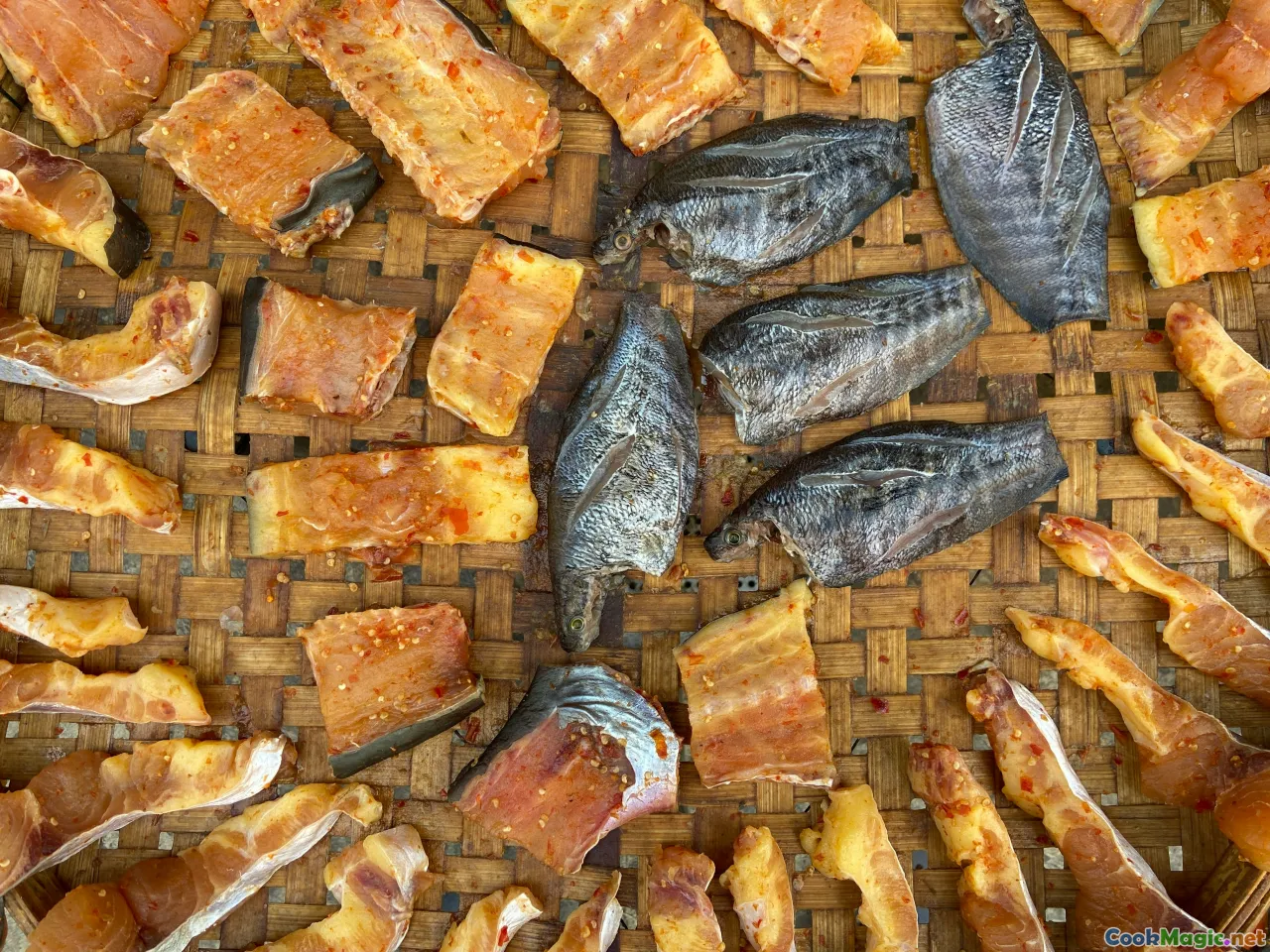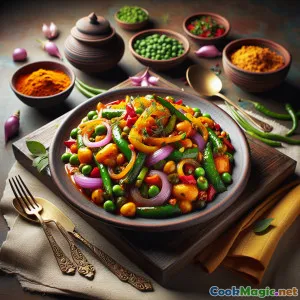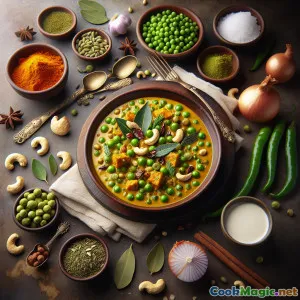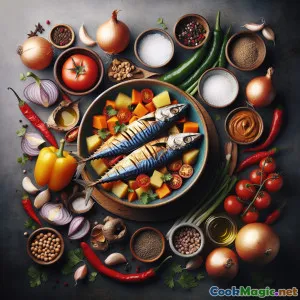
Domoda di Tamarindo Affumicato: Uno stufato di pesce dell'Africa Occidentale
(Smoky Tamarind Domoda: A West African Fish Stew)
(0 Recensioni)0
825
luglio 23, 2025
Segnala un problema
Ingredienti
-
350 grams Filetti di sgombro affumicati
(boneless, skin removed if desired)
-
60 grams Polpa di tamarindo
(soaked in 120ml warm water)
-
80 grams Burro di arachidi liscio
(Senza zucchero)
-
2 medium Cipolle
(Tagliato finemente)
-
3 large Pomodori freschi
(chopped, or use a 400g can)
-
2 large Carote
(Sbucciato e affettato)
-
2 medium Patate
(Pelato e tagliato a pezzi)
-
250 grams Zuccha butternut
(peeled, cut into 2cm cubes)
-
1 large Peperone rosso
(deseeded and chopped)
-
3 cloves Spicchi d'aglio
(Tritato)
-
1 thumb-size Zenzero fresco
(Grattugiato)
-
2 tbsp Olio vegetale
-
0.5 whole Peperoncino Scotch bonnet
(tritato finemente, regolare a piacere)
-
2 tbsp Concentrato di pomodoro
-
900 ml Brodo di pesce
(Or water with bouillon)
-
1 tsp Sale
(A piacere)
-
0.5 tsp Pepe nero
-
2 tbsp Coriandolo Fresco
(Tritato, per guarnire)
-
600 grams Riso Cotto
(Da servire)
(boneless, skin removed if desired)
(soaked in 120ml warm water)
(Senza zucchero)
(Tagliato finemente)
(chopped, or use a 400g can)
(Sbucciato e affettato)
(Pelato e tagliato a pezzi)
(peeled, cut into 2cm cubes)
(deseeded and chopped)
(Tritato)
(Grattugiato)
(tritato finemente, regolare a piacere)
(Or water with bouillon)
(A piacere)
(Tritato, per guarnire)
(Da servire)
Nutrizione
- Porzioni: 4
- Dimensione Porzione: 1 ciotola (350g)
- Calories: 560 kcal
- Carbohydrates: 0 g
- Protein: 27 g
- Fat: 20 g
- Fiber: 9 g
- Sugar: 8 g
- Sodium: 902 mg
- Cholesterol: 60 mg
- Calcium: 130 mg
- Iron: 4.2 mg
Istruzioni
-
1 - Prepare Tamarind:
Soak tamarind pulp in warm water for 10 minutes. Massage to release the tart juices, then strain and reserve the liquid, discarding any seeds or fibers.
-
2 - Sauté base aromatics:
Heat oil in a large pan. Add onions and cook for 3-4 minutes until soft. Add ginger, garlic, and Scotch bonnet (if using); cook 1-2 minutes until fragrant.
-
3 - Build Vegetables:
Add carrots, potatoes, pumpkin, red pepper, and tomatoes. Stir in tomato paste. Cook for 4-6 minutes until vegetables slightly soften and tomatoes break down.
-
4 - Incorporate Peanut Butter & Tamarind:
Add peanut butter and the strained tamarind liquid. Stir well to create a thick paste. Gradually add fish stock, stirring to combine smoothly and prevent lumps.
-
5 - Simmer Stew:
Reduce heat, season with salt and black pepper. Cover and simmer stew for 20-25 minutes, stirring occasionally, until vegetables are tender and flavors meld.
-
6 - Add Smoked Fish:
Gently fold in smoked mackerel fillets. Simmer uncovered for a final 3 minutes, just to warm the fish and infuse its smokiness throughout the stew.
-
7 - Garnish & Serve:
Ladle the stew over bowls of cooked rice. Garnish with fresh coriander. Serve steaming hot for an authentic experience.
Soak tamarind pulp in warm water for 10 minutes. Massage to release the tart juices, then strain and reserve the liquid, discarding any seeds or fibers.
Heat oil in a large pan. Add onions and cook for 3-4 minutes until soft. Add ginger, garlic, and Scotch bonnet (if using); cook 1-2 minutes until fragrant.
Add carrots, potatoes, pumpkin, red pepper, and tomatoes. Stir in tomato paste. Cook for 4-6 minutes until vegetables slightly soften and tomatoes break down.
Add peanut butter and the strained tamarind liquid. Stir well to create a thick paste. Gradually add fish stock, stirring to combine smoothly and prevent lumps.
Reduce heat, season with salt and black pepper. Cover and simmer stew for 20-25 minutes, stirring occasionally, until vegetables are tender and flavors meld.
Gently fold in smoked mackerel fillets. Simmer uncovered for a final 3 minutes, just to warm the fish and infuse its smokiness throughout the stew.
Ladle the stew over bowls of cooked rice. Garnish with fresh coriander. Serve steaming hot for an authentic experience.
Ulteriori informazioni su: Domoda di Tamarindo Affumicato: Uno stufato di pesce dell'Africa Occidentale
Domoda de Poisson Fumé et Tamarins: A Tangy West African Stew With an English Twist
Domoda, often called groundnut stew, is one of the iconic dishes of The Gambia, known for its peanut-rich base, hearty vegetable medley, and luxurious, velvety finish. This creative take, 'Domoda de Poisson Fumé et Tamarins,' pulls deeply from the mustard-gold bowls of the Senegambia river region while fusing contemporary English taste with globally loved smoky and sour notes. The inclusion of smoked fish — here, rich smoked mackerel — connects the dish to both African and British culinary traditions, while tart tamarind adds a bright, mouth-puckering accent.
Many classic domoda recipes are built on either beef or chicken; in coastal stretches, though, fish—often smoked and intensely flavorful—takes center stage. Pairing that with tamarind gently pivots this dish towards a flavor apex rare in European kitchens but well-trodden in West African homes. This recipe’s unique aspect lies in melding gentle, rich peanut earthiness with elegant layers of tangy fruit—complex, but never overwhelmed.
History & Cultural Significance
Domoda isn’t just a comfortable meal; it is deeply intertwined with communal eating in Gambian and Senegalese societies, centered on large, shared platters. It marks ceremonies, reunions, and simply everyday comfort. The choice of fish, particularly mackerel, alludes to both seaside English smokehouses and Gambian traditions where preservation and maximizing flavor are vital in a hot climate.
The process—labored but accessible—reflects how stews travel universally: they await your creativity with what’s at hand, adapting to the beautiful randomness of home kitchens. The use of tamarind in this twist pays homage to historical trade, reflecting how South Asian influences met West African pulses, forever changing stew flavors; West Africa is a crossroads, after all, and its cuisine peaks with such hybridity.
Cooking & Serving Tips
- Smoking Fish: The smoked mackerel lends both savory depth and a pleasing oily richness ideal for this dish. Seek plump fillets, but you may substitute smoked haddock, trout, or even vegan substitutes for a veg-friendly experience.
- Tamarind Pulp: If you can’t obtain pure pulp, tamarind paste (used in moderation and diluted with water) will suffice—adjust to taste, and beware: tamarind’s citric pucker is bold.
- Peanut Butter: An authentic domoda uses crushed peanuts; however, butter saves time and remains beautifully velvety. Always select the unsweetened, natural style. A tip: briefly fry the paste for greater aroma before adding liquids.
- Vegetables: Potatoes, squash, carrots, peppers—use what’s in season. Sweet potatoes or yams make fantastic substitutes.
- Spice & Heat: The Scotch bonnet lifts the whole stew—it’s optional yet delightful. Handle with care, balancing as per your preference for fire!
- Serving: Always ladle this over simply steamed rice—basmati or a short-grain African variety works best. Millet couscous or quinoa is possible for adventurous eaters seeking new grains. A scatter of fresh coriander lifts the spirits and brightens flavors just before serving.
Unique Aspects & Personal Thoughts
This fusion domoda is special because it respects essential techniques (gentle braising of vegetables, patience with aromatics, time taken with tamarind pulp straining) while remaining receptive to British fresh produce and preferences. The gentle rehydration and folding in of the smoked fish at the end avoids toughness while welcoming layers of aroma. The tamarind here isn’t just sharpness—instead, it wraps its complex fruity sharpness around luxury peanut and smoky sea-freshness, anchoring old traditions in a new world.
Finally, 'Domoda de Poisson Fumé et Tamarins' isn’t a simple stew; it’s a table-wide journey for friends and family: unexpected, comforting, yet electrified with new flavor bridges. I recommend serving with extra lime wedges on the side, just as they might in Banjul, for those who crave real zest. Most of all, cherish the moments this stew brings—full of shared stories and contented silence alike.

